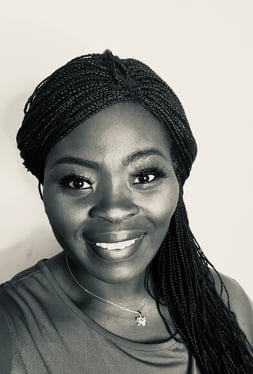Black mothers are nearly three times as likely to die from pregnancy-related complications as their white peers.
For every three White mothers dead from pregnancy-related complications, there are nine Black mothers that lose their lives.
The statistic has been shared so often that it's in danger of losing its impact, so we made a visual. This is is what 1:3 looks like:
None of these women should be at risk of dying, especially in one of the wealthiest countries in the world — which, by the way, spends the greatest portion of its GDP on healthcare. Our mission at Babyscripts is to eliminate these statistics by supporting women in a safe and healthy life up to and long beyond childbirth.
One of the ways that we do this is through educational campaigns. These campaigns are crafted to address timely concerns and update patients on topical matters that may affect their pregnancy. They’re sent to Babyscripts moms through the myJourney platform with the approval of their care team.
This month we have an especially relevant campaign focused on Black maternal health and the risks facing pregnant women of color, written by a member of our Medical Advisory Board.
Introducing Hannah George, MBA, MSN, RN
Ms. George has worked in high-risk maternal healthcare from day one. Even before she was married with children of her own, she had a front-row seat to the challenges facing Black women planning to have a child, starting her career on the high-risk antenatal and postpartum floor at MedStar Washington Hospital in DC. There she began what she describes as her lifelong learning journey to understand maternal health, which has taken her from clinical to academic to home care spaces, from work at MedStar Health to an FQHC, and now to her role as a consultant transforming the way healthcare is delivered. Along the way, she’s encountered every risk, from systemic barriers to biological proclivities to socioeconomic concerns.
Hannah experienced those barriers in a very real and proximate way during the birth of her own children, developing preeclampsia in her second pregnancy and having a low birth weight baby, which brought her a lot of anxiety. In her words, even “knowing the textbook,” experiencing a complicated pregnancy first hand was extremely stressful.
How much more so for women that don’t know what they are up against?
Women who receive a high-risk diagnosis can struggle with it both mentally and physically , which is why educating women is so important, and so close to Hannah's heart. Education helps women to manage their expectations going into a pregnancy, empowered by knowledge to feel in control of their journey, understanding the risks and tempering anxiety.
Talking about risk prepares women to have better pregnancies.
Hannah drew on her personal experience to write the myJourney resource. Though she is a very private person, she was inspired to share her story knowing that her own birthing experience as a woman of color could prepare mothers for the questions and conversations that they should be having with their providers:
"I went back into the hospital after my second — I wasn’t exactly fighting for my life, but if I hadn’t gone in for my postpartum checkup I could have been in a lot of danger. This resource is a way to let women know the importance of receiving proper care and asking lots of questions — they don't know what they don't know."
Dr. Lauren Demosthenes, Senior Medical Director of Babyscripts, who collaborated on the resource, added:
"Visits are pretty fast, and it’s easy to tell that providers are in a hurry. So we really want to empower women to advocate for themselves, to let them know that it’s okay to ask questions, to give them the tools to ask the right questions."
The goal of the resource is not to make women afraid of something that is natural for their bodies, but to give them power through knowledge, and to emphasize the importance of proactive care. Childbirth is natural, yes — but it can also be dangerous, especially for vulnerable populations. It’s important for women to take these things seriously, to have motivation to attend appointments especially when they face difficulties.

Submit a comment